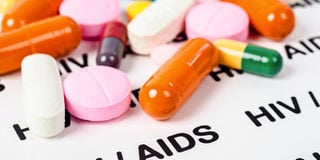Premium
HIV drug to be made locally

Kenya has been registering a steady decline in the number of infections within the past 10 years.
What you need to know:
- The tender has been awarded to Universal Corporation Limited, a local firm.
- Making DTG accessible to as many patients as possible became crucial in stemming the spread of the disease.
What would you do if your body developed resistance to drugs that are supposed to fight the disease ailing you? If this disease then is the deadly HIV, which wreaks havoc a patient’s immune system and leaves it vulnerable to all sorts of opportunistic ailments, you are in big trouble.
But this is the fate that befell about 225,000 Kenyan HIV patients who were using third agent HIV antiretroviral therapy drug efavirenz in their treatment regimen.
To suppress the killer disease, HIV patients follow a treatment regimen where they take a combination of ARV drugs daily that not only reduces their transmission chances but also enables them to live longer, healthier lives.
This treatment normally consists of two nucleoside reverse-transcriptase inhibitor (called NRTIs), usually the drugs tenofovir and either lamivudine or emtricitabine, and a third agent, which could be either a boosted protease inhibitor (bPI), Integrase inhibitors (INIs) or a non-nucleoside reverse-transcriptase inhibitors (NNRTIs).
The drug efavirenz belongs in this third class, and is administered especially when a patient has developed resistance to a drug in any of the other categories.
When a massive number of HIV patients developed resistance to this drug across the world, it was crucial for a new line of drug that would suppress the virus but crucially, at the same time, be affordable and accessible. Enter Dolutegravir (DTG).
Affordable prices
The drug was developed by pharma ViiV Healthcare and in 2015 received the World Health Organization’s (WHO) nod for treatment of the disease and has been tested to be more effective, while it also has no associated side effects as has been reported with most ARVs.
However, it was the pharma’s move to partner with governments and other stakeholders across the world to ensure that it reaches more people faster and at affordable prices that has proved a game changer for Kenya in the fight against the HIV pandemic.
In 2017, Kenya became the first country in Africa to receive the generic treatment with an initial 27,000 HIV patients who had developed resistance to efavirenz as first recipients of the drug for free before production was escalated to reach more patients.
Making DTG accessible to as many patients as possible became crucial in stemming the spread of the disease, owing to the fact that the cost.
The result was that just about one million HIV patients were taking ARVs, against the total number of the patients in the country which is estimated at 1.5 million. Kenya moved to make generic DTG drugs locally which has given a boost to the government’ s fight against the disease, which kills about 25,000 Kenyans a year.
However, the country has been registering a steady decline in the number of infections within the last 10 years. Nascop says the manufacturer of generic versions of the drug is also a part of the the Big 4 Agenda that aims to promote local industries and create employment opportunities. The tender has been awarded to Universal Corporation Limited, a local firm.




